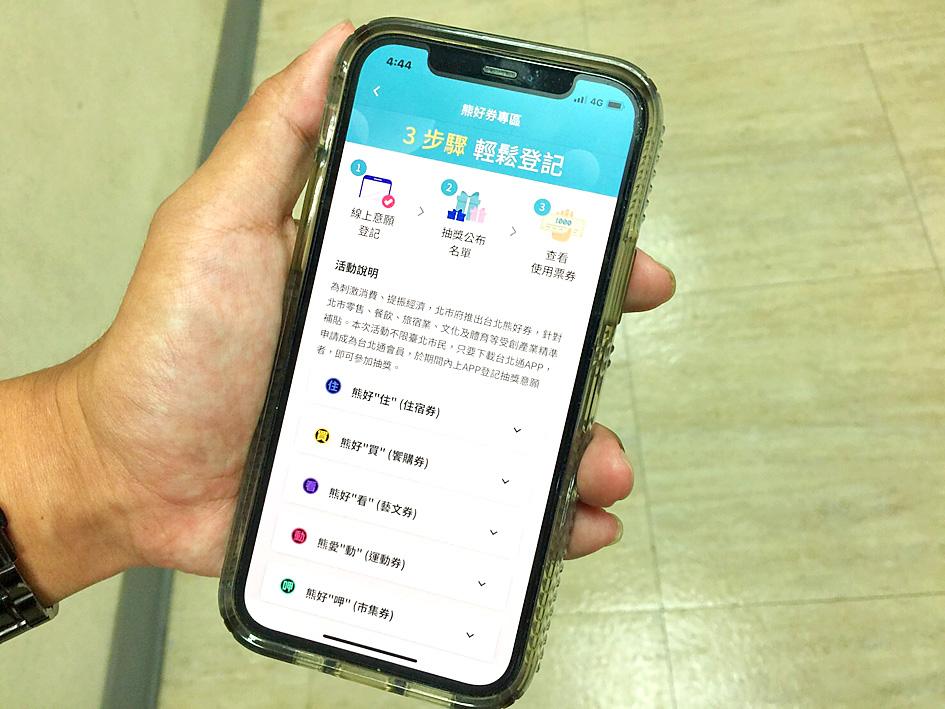Taipei City Councilor Miao Po-ya (苗博雅) yesterday said that her campaign against the Taipeipass (台北通) app has garnered almost 10,000 signatures since Friday, but exposed her to insults and threats by telephone and through social media.
It seems to be a “coordinated attack,” as all the messages follow a similar pattern, she said, citing as an example one saying: “We love the Taipeipass. Do not block the smart city plan. Stop interfering with Taipei Mayor Ko Wen-je (柯文哲).”
Some people had left disparaging remarks and false information when signing up for the online petition, and there have been attempts to disrupt her communications on social media, said Miao, who is a member of the Social Democratic Party.

Photo: Cheng Ming-hsiang, Taipei Times
She jointly launched the campaign with Democratic Progressive Party (DPP) Taipei City Councilor Wu Pei-yi (吳沛憶), and independent Taipei city councilors Lin Liang-chun (林亮君) and Huang Yu-fen (黃郁芬).
Ko has been promoting the use of the app to access municipal services and said that it should be linked to COVID-19 vaccine information.
Announcing the petition, the four councilors said: “Ko and his officials are heading toward a Chinese style of exercising central control ... including tracking people’s movement, activities and transactions.”
Democratic institutions must respect the right to privacy, they said.
Taipei residents might want the capital to become a smart city, but they do not want “centralized control, tracking and mass surveillance,” they said.
The use of the Taipeipass should be voluntary, Miao said, accusing Ko of increasingly introducing mandatory schemes under the pretext of smart city efforts.
By increasingly collecting personal information of residents, the schemes contravene the Personal Information Protection Act (個人資料保護法), Miao said.
The Taipei City Government has been promoting the app as a “one-stop solution” for a large range of services, including as a platform to pay utility bills, taxes, parking tickets, reporting incidents to police and claiming benefits at stores.
The four city councilors said that Taipei residents are forced to use the app when accessing services including borrowing books at public libraries, obtaining student cards, paying school fees, participating in workshops organized by the city government, registering for childcare benefits and entering sports facilities.
Data security advocates have said that the app is prone to breaches that might affect national security, such as when services linked to the app are handled by Chinese firms.
Separately, Taipei city councilors have said that the legal basis on which the app operates and gathers data is unclear.

The manufacture of the remaining 28 M1A2T Abrams tanks Taiwan purchased from the US has recently been completed, and they are expected to be delivered within the next one to two months, a source said yesterday. The Ministry of National Defense is arranging cargo ships to transport the tanks to Taiwan as soon as possible, said the source, who is familiar with the matter. The estimated arrival time ranges from late this month to early next month, the source said. The 28 Abrams tanks make up the third and final batch of a total of 108 tanks, valued at about NT$40.5 billion

Travel agencies in Taiwan are working to secure alternative flights for travelers bound for New Zealand for the Lunar New Year holiday, as Air New Zealand workers are set to strike next week. The airline said that it has confirmed that the planned industrial action by its international wide-body cabin crew would go ahead on Thursday and Friday next week. While the Auckland-based carrier pledged to take reasonable measures to mitigate the impact of the workers’ strike, an Air New Zealand flight arriving at Taipei from Auckland on Thursday and another flight departing from Taipei for Auckland on Saturday would have to

A group from the Taiwanese Designers in Australia association yesterday represented Taiwan at the Midsumma Pride March in Melbourne. The march, held in the St. Kilda suburb, is the city’s largest LGBTQIA+ parade and the flagship event of the annual Midsumma Festival. It attracted more than 45,000 spectators who supported the 400 groups and 10,000 marchers that participated this year, the association said. Taiwanese Designers said they organized a team to march for Taiwan this year, joining politicians, government agencies, professionals and community organizations in showing support for LGBTQIA+ people and diverse communities. As the first country in Asia to legalize same-sex

MOTIVES QUESTIONED The PLA considers Xi’s policies toward Taiwan to be driven by personal considerations rather than military assessment, the Epoch Times reports Chinese President Xi Jinping’s (習近平) latest purge of the Chinese People’s Liberation Army (PLA) leadership might have been prompted by the military’s opposition to plans of invading Taiwan, the Epoch Times said. The Chinese military opposes waging war against Taiwan by a large consensus, putting it at odds with Xi’s vision, the Falun Gong-affiliated daily said in a report on Thursday, citing anonymous sources with insight into the PLA’s inner workings. The opposition is not the opinion of a few generals, but a widely shared view among the PLA cadre, the Epoch Times cited them as saying. “Chinese forces know full well that